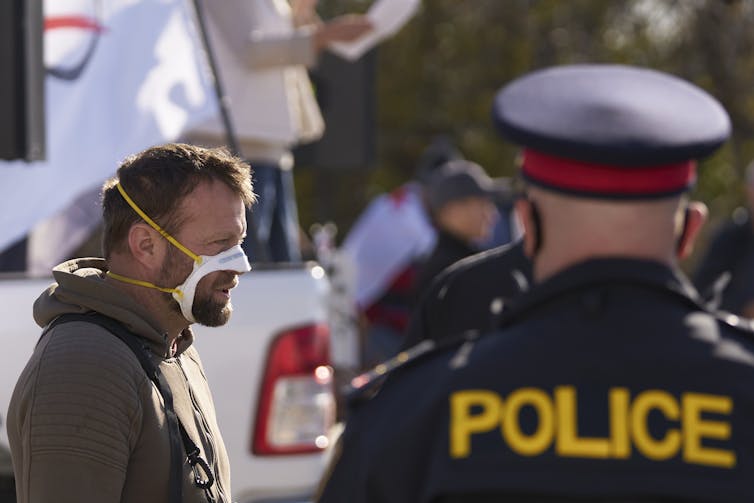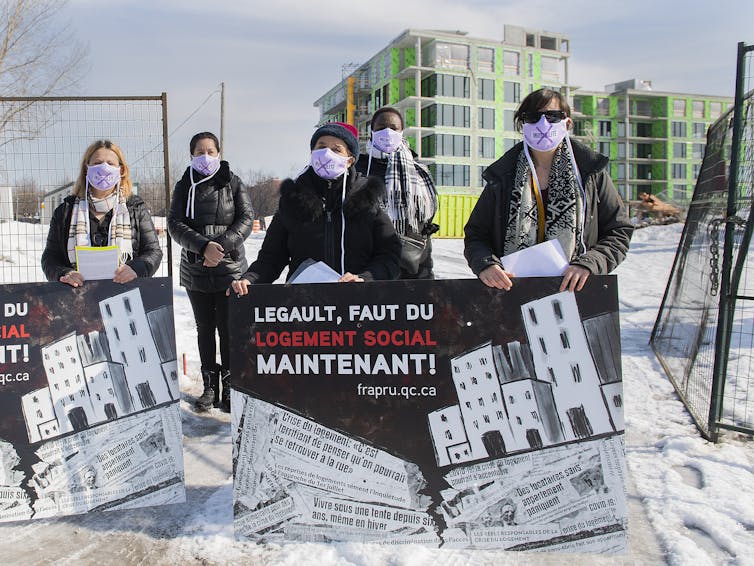
Vivek Venkatesh, Concordia University; Cécile Rousseau, McGill University; David Morin, Université de Sherbrooke , and Ghayda Hassan, Université du Québec à Montréal (UQAM)
As the COVID-19 pandemic enters its second year, evidence continues to grow that an unequal burden of illness and death has fallen on marginalized people. At the same time, the collateral damage of a year of shutdowns and confinement — including economic difficulties, social isolation and mental health problems — disproportionately affects racialized communities.
Reports show an increase in domestic violence and possibly in child maltreatment during the pandemic. This is partially due to decreased access to protective family and social networks as well as school resources.
Read more: The model minority myth hides the racist and sexist violence experienced by Asian women
Further reports show an increase in discrimination towards minorities, as well as a rise in hate speech and tensions that target racialized groups. Several violent incidents, including the mass shooting in Atlanta, have targeted Asian people.
Increased risks and lowered resiliency
Our team of interdisciplinary psychiatrists, psychologists, social scientists and education specialists has focused on assessing the social and cultural impact of COVID-19 on marginalized Canadian communities. Our results suggest that the pandemic has not only decreased resiliency for individuals as well as communities, but has also simultaneously increased risk factors for violence.
For example, two key approaches to prevention — lockdowns and travel restrictions — have been topics for increasingly divisive political discussion. Meanwhile, there has also been growing anxiety surrounding economic uncertainty during the pandemic. Both of these factors have increased social polarization linked to race.

The rapid online spread of conspiracy theories assigns blame to specific minority groups for the present crisis. Elsewhere, economic and social consequences of the pandemic are adversely affecting people who earn lower incomes.
Read more: COVID-19 has been much harder on those who already had anxiety and financial issues
Social isolation or over-crowded housing and an increase in substance abuse amplify the fragile mental health of stressed individuals facing an uncertain future. These factors are also occurring in increasingly polarized political contexts such as the recent insurrection at the Capitol, which in turn increased the odds of inter-group violence.
These phenomena are not unique to North America and Europe, with examples of organized violence by the public followed by state-led retaliatory action on the rise worldwide. Threats to civil liberty to enforce public health measures and control protest or dissent have exposed unaddressed, underlying grievances of systemic discrimination and fuelled sentiments of global injustice.
Applying the lessons learned
Public health policy can weigh the risks and benefits associated with potential COVID-19 transmission, with the effects of shutdown and confinement on specific groups such as racial minorities. While pursuing control of the COVID-19 pandemic protection via vaccination programs, now is the time to promote a public health perspective based on human rights that emphasizes the interconnected roles of social policies, education and the media.

Lessons learned during the first wave of the pandemic can inform the plans for lifting lockdowns and restrictions, as well as approaches to prevention and resilience as the pandemic continues. These should include the issue of social and interpersonal violence prevention. Consultation with community organizations, faith-based communities and other local groups in advance of lockdowns being lifted can inform decisions about which groups are most in need of protection as restrictions lift.
Research on prevention of different forms of violence reveals approaches that can help reduce discrimination and behaviour based on prejudice. These approaches include analyzing all perspectives before arriving at judgments and learning how to empathize with those who are less fortunate.
An important role for health and education professionals is to advocate for Indigenous and racialized peoples experiencing the marginalizing consequences of the pandemic, such as its potentially damaging impact on their mental health. This advocacy may help preserve basic needs such as access to health care as well as social and community services and decrease psychological distress and reduce violence.
While working to curb the current wave of the pandemic, governments and health systems can be be better prepared than they were for the first wave. Beyond the physical health impact of COVID-19 on society, the related interpersonal and social violence can be devastating, and require immediate attention.
Vivek Venkatesh, UNESCO co-Chair in Prevention of Radicalisation and Violent Extremism; Professor of Inclusive Practices in Visual Arts, Faculty of Fine Arts, Concordia University; Cécile Rousseau, Professor, Division of Social and Cultural Psychiatry, McGill University; David Morin, Chair professor, Faculté des Lettres et sciences humaines, École de politique appliquée, Université de Sherbrooke , and Ghayda Hassan, Professor, Clinical Psychology, Université du Québec à Montréal (UQAM)
This article is republished from The Conversation under a Creative Commons license. Read the original article.

